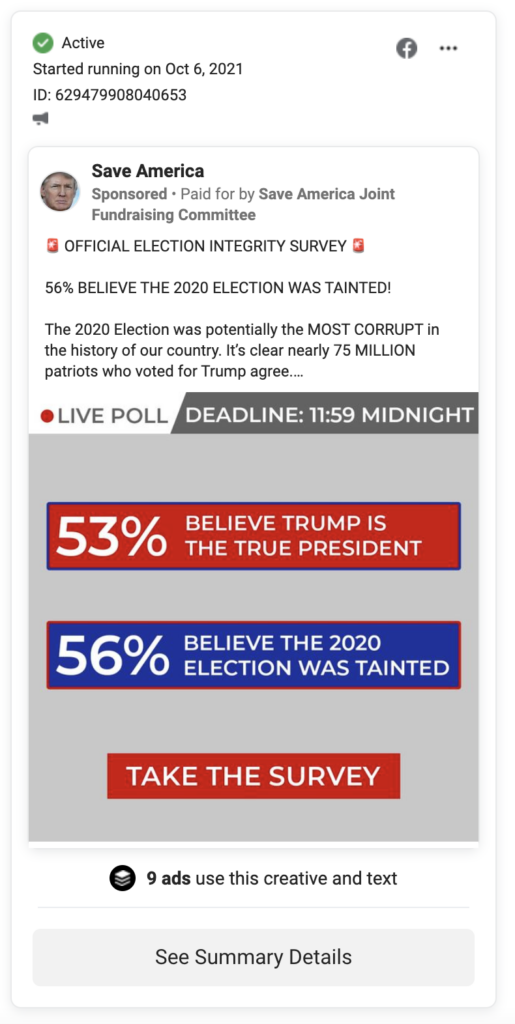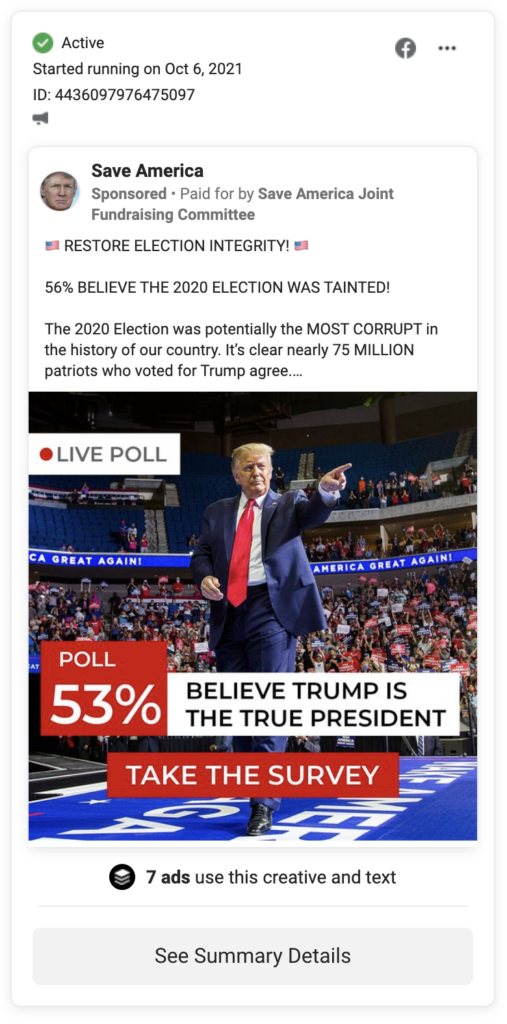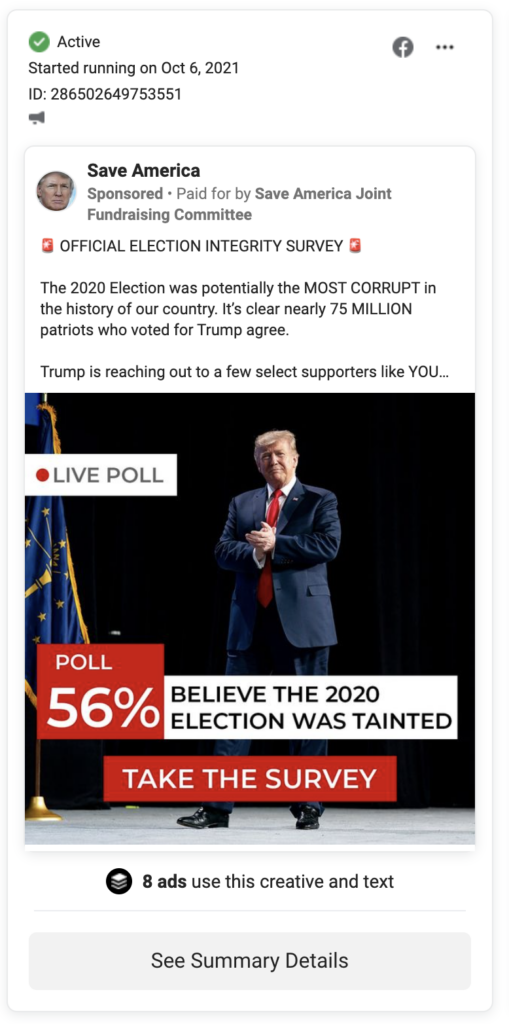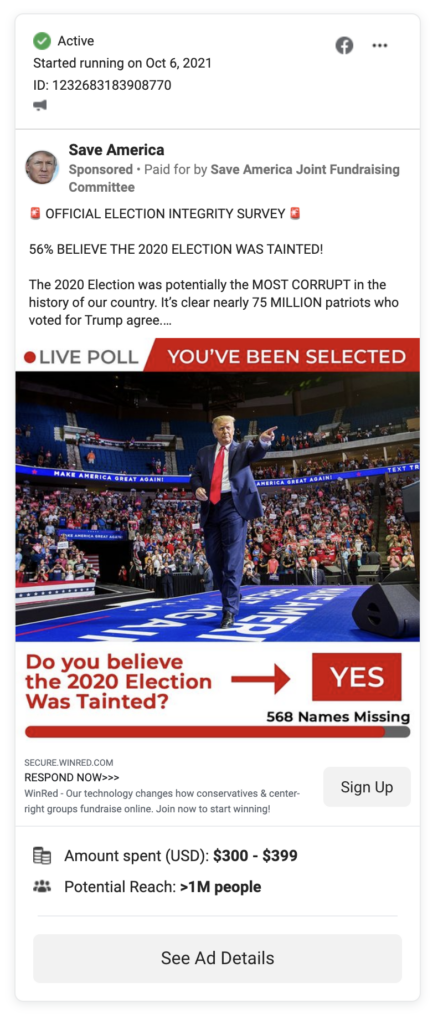Facebook Permits Trump PAC Ads That Question 2020 Election Outcome
Justin Hendrix / Oct 8, 2021On Wednesday, former President Donald Trump issued a statement justifying the January 6th insurrection at the U.S. Capitol as "a day of protesting the Fake Election results" and calling the November 3rd election "the real insurrection," while a group associated with him purchased ads on Facebook pushing false messages that suggest the 2020 election "was potentially the MOST CORRUPT in the history of our country."
But while the content of the ads-- paid for by the Save America Joint Fundraising Committee, which is reportedly a joint venture between former President Donald Trump’s Save America leadership PAC and his Make America Great Again PAC-- may insinuate that "Trump is the true President," they may not violate Facebook's political advertising policies.
"There is a big difference between what Facebook should allow and not allow versus what is legally permissible," said David Brody, Senior Counsel & Senior Fellow for Privacy and Technology at the Lawyers’ Committee for Civil Rights Under Law. "This is an attempt to spread untruths about the 2020 election."




In September 2020, Facebook CEO Mark Zuckerberg announced special policies ahead of the November election that addressed false claims of victory or messages that seek to "to delegitimize the outcome of the election," but it is unclear if these ads would fall into this category. The company's Vice President of Integrity, Guy Rosen, issued an update to this policy in October 2020 that said Facebook would add context around any post from a candidate that declared "premature victory before a race is called," which Trump ultimately did.
"It's possible this doesn't technically violate the precise text of Facebook's narrowly written rules," said Jesse Lehrich, co-founder of Accountable Tech, an advocacy group that pushes for tech reform. "But it flies in the face of their countless proclamations about their commitments to election integrity. It couldn't be more obvious that the intent of the ads is to perpetuate the Big Lie."
Accountable Tech joined Common Cause and other progressive groups in a July 2021 letter stating that Facebook's current policies fail "to consider how public figures can use political committees under their control to violate Facebook’s Community Standards, circumventing enforcement action."
Trump was banned from Facebook for his role in inciting the deadly January 6 insurrection at the U.S. Capitol. That ban is in place until at least 2023, when the company may reassess it. Facebook has previously stated that posts that constitute circumvention of Trump's ban on the platform would result in action, but that groups affiliated with him- such as Save America- are free to post and presumably run ads.
“President Trump is suspended from Facebook so he can't post at all," Facebook communications director Andy Stone told Politico in a statement in June. "Groups affiliated with the former president are not barred from posting on Facebook so long as they are not posting in his voice."
But other elements of the ads raise questions about how such policies might be interpreted. For instance, the ads use Trump's face as the avatar, the same one that he used on his now-banned personal Facebook account.
“The challenge with deplatforming someone like former President Trump is how far the ban extends," said Katie Harbath, CEO of the consultancy Anchor Change and a former Facebook public policy director. "In this instance can a page use the exact same avatar that Trump used which could mislead people into thinking it's one of his? Platforms will need to be more specific about this going forward.”
And, the ads may contain other misleading elements. For instance, they indicate the user can click through to participate in a "live poll", but the landing page is a typical email sign up with a radio button that gives a binary choice between the options "Yes, President Trump was right!" and "No, I'm a Democrat!". This combination of buttons and text may add up to what Facebook terms "nonexistent functionality," which is not permitted under its policies.
More platform transparency may help, but it may be time for regulators to bring clarity to such matters, said Matt Perault, Director of the Center on Technology Policy at the University of North Carolina at Chapel Hill, and also a former public policy director at Facebook.
"This is a cat and mouse game, and we need stronger guidance from Congress and the Federal Election Commission on the guidelines for political advertising," said Perault.
Still, Facebook could do more, argues Perault's UNC colleague, Daniel Kreiss, a professor in the Hussman School of Journalism and Media.
"If you have a democracy-frame on your policies, you would say these ads are clearly designed to question the election outcome. But Facebook doesn't. It has a narrow interpretation of election disinformation," said Kreiss.
This piece may be updated with responses to questions sent to Facebook.
Authors
